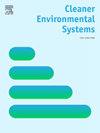推进汽车行业的可持续发展:对环境、社会和治理(ESG)绩效指标的批判性分析
IF 4.9
Q2 ENGINEERING, ENVIRONMENTAL
引用次数: 0
摘要
随着行业可持续性问题的增加,ESG(环境、社会、治理)变得越来越重要。汽车行业是一个在可持续发展方面受到极大关注和压力的行业,越来越多的法规将其推向可持续发展。然而,由于许多因素的影响,ESG的改善可能会更有效。虽然以前的研究已经揭示了汽车行业ESG关键绩效指标(kpi)的评估和优先级,但仍然需要其他方法来确定关键因素之间的优先级和相互依赖性,从而增强组织的战略改进措施。该研究旨在通过识别ESG报告标准中的关键指标,并利用模糊DEMATEL和模糊TOPSIS方法来探索汽车行业ESG kpi的优先级和因果关系,从而解决差距。研究结果表明,在确定的17个因素中,前三个是影响其他因素提高ESG绩效的最优先因素,包括公司治理、空气排放和可持续产品开发。研究结果还强调了在加强利益相关者关系方面解决社会可持续性问题的重要性,例如人权和劳工实践。汽车行业的企业可以利用该研究的见解来增强其可持续发展战略,确定关键的改进机会,并对实现可持续发展目标的优先事项进行排序。决策者可以利用它来促进全行业的可持续发展努力,并建立监管框架。本文章由计算机程序翻译,如有差异,请以英文原文为准。
Advancing sustainability in the automotive sector: A critical analysis of environmental, social, and governance (ESG) performance indicators
ESG (Environment, Social, Governance) is becoming increasingly important as sustainability concerns in the industry increase. The automotive industry is one that receives significant attention and pressure on sustainability, with the ever-growing regulations pushing it towards sustainability. However, ESG improvement could be more effective due to the many factors. Although previous studies have revealed the evaluation and prioritization of ESG key performance indicators (KPIs) in the automotive sector, there is still a need for other approaches to identify the priorities and interdependencies between critical factors that enhance organizational strategic improvement measures. The study aims to address the gaps by identifying critical indicators in ESG reporting standards and utilizing Fuzzy DEMATEL and Fuzzy TOPSIS methodologies to explore the priorities and causal relationships of ESG KPIs in the automotive industry. The findings indicate that the top three of 17 identified factors are the top priorities that influence others in improving ESG performance, including corporate governance, air emissions, and sustainable product development. The importance of addressing social sustainability issues in strengthening stakeholder relationships is also highlighted in the research findings, such as human rights and labor practices. Businesses in the automotive sector can use the study's insights to enhance their sustainability strategies, determine critical opportunities for improvement, and rank their priorities to achieve sustainability objectives. Policymakers can use it to promote industry-wide efforts for sustainable development and create regulatory frameworks.
求助全文
通过发布文献求助,成功后即可免费获取论文全文。
去求助
来源期刊

Cleaner Environmental Systems
Environmental Science-Environmental Science (miscellaneous)
CiteScore
7.80
自引率
0.00%
发文量
32
审稿时长
52 days
 求助内容:
求助内容: 应助结果提醒方式:
应助结果提醒方式:


